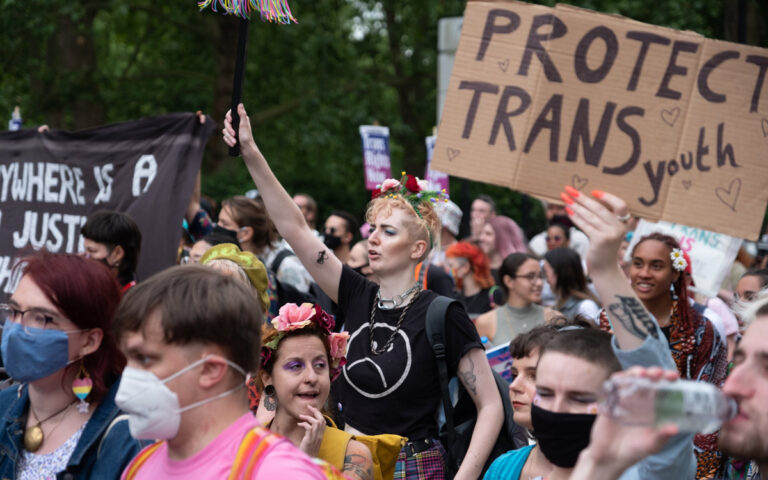Alabama Governor signs new bill which will force trans youth to detransition
Alabama, oh Alabama, what planet are you choosing to live on? Just when you think human intelligence takes one step forward, there are always a few that take us many steps back. Alabama Governor Kay Ivey, as well as other legislators in the state, have approved one of the most condemning bills yet.
Doctors that have been prescribing puberty blockers, hormone therapy or surgery to transgender youths will now be legally prohibited to do so, despite clear explanation from health care providers that irreversible treatments are never performed on minors. Any medical provider that chooses to defy this new bill will, shockingly, be liable for up to ten years in prison for the ‘crime’. So, what exactly does the Senate Bill 184 entail and what could it mean for Alabama’s LGBTQIA+ youth?
According to Dazed, the bill will criminalise gender-affirming care for transgender youth and essentially force school staff to ‘out’ transgender students to their parents—prohibiting “a nurse, counsellor, teacher, principal or other administrative officials at a public or private school” from “encouraging or coercing a minor” to withhold their gender identity, when it is “inconsistent with [their] sex,” from the respective parent or guardian.
Ivey’s signature will make Alabama the third state in the US to pass a measure restricting gender transition-related care but will be the first to enforce criminal penalties as a result. The governor said in a statement that her signing of the bill was because “if the Good Lord made you a boy, you are a boy, and if he made you a girl, you are a girl.” Continuing that “we should especially protect our children from these radical, life-altering drugs and surgeries when they are at such a vulnerable stage in life.”
Also approved by Ivey is the House Bill 322, which requires public schools (kindergarten through twelfth grade) to designate the use of rooms where students may be in various stages of undress on the basis of biological sex, NBC news reported. Republican Representative Scott Stadthagen and the sponsor of the infamous ‘bathroom bill’, (which he says is meant to protect girls) stated, “It’s a problem that was brought to my attention last fall,” and that “the bill is short and sweet. It says whatever your original birth certificate states as your gender, that is the bathroom you use in K-12 schools.”
The 184 Bill is currently headed to land on Republican Ivey’s desk, who is expected to officially sign the legislation into law with full capability to do so, but, thankfully, all hope is not lost—human rights groups are pushing back, as are the rest of us, in whatever ways we can. The American Civil Liberties Union, Lambda Legal and the Transgender Law Center have vowed to take legal action against the state if Ivey signs the bill into law. “If Alabama lawmakers insist on passing this cruel, dangerous, and unconstitutional legislation into law, the state will immediately have a lawsuit to deal with,” Sruti Swaminathan, staff attorney for Lambda Legal, announced.
This restrictive and deeply harmful bill against gender-affirming medical care will become law just 30 days after the governor’s signature which is yet to be formally declared. To this, Swaminathan expressed, “The Alabama Legislature and Governor Kay Ivey need to consider the time and resources they will invest” and to truly “ask themselves if targeting the health care of children is really worth it.” My bet is obviously not, Ivey.
Chase Strangio, deputy director for Trans Justice with the ACLU’s LGBTQ & HIV Project added to the ACLU press release saying: “The way to reduce harm to trans youth is to provide them with gender-affirming health care where it is medically indicated. This bill takes that lifesaving treatment option off the table and makes it a felony. Moving forward with this bill will be deadly for trans youth, push doctors out of a state that has a shortage of medical providers, hurt Alabama’s economy, and subject the state to costly litigation.”
Medical groups in the past have repeatedly objected to similar measures that arose at those times and argued that these laws will only deny patients and their families much-needed access to evidence-based care. As reported by The Independent, a joint statement from six major medical associations in 2019 expressed that the groups are “strongly opposed to any legislation or regulation that would interfere with the provision of evidence-based patient care for any patient, affirming our commitment to patient safety.”
Even so, the 184 Bill is just one out of the many hundreds currently being introduced across the US right now, ‘no matter who they hurt’ reports The Independent—legislations that specifically target transgender people in the country have jumped from 18 in 2018, to a whopping 150 in 2022. These directly put vulnerable young people at risk of physical, mental and emotional harm, and where will they turn to for advice? Well, with this bill it won’t be trained specialised figures of authority like teachers, doctors, nurses.
The trans youth and families directly affected by the bill are understandably terrified by the looming results if the restrictions take effect. Students have expressed concern that their families will react negatively to their gender identity being exposed by school faculty, that they will be kicked out of the house or even worse. Not to mention the poor mental health repercussions, self-harm and long term health consequences of halting hormone treatment for trans teens that have become accustomed to taking them, the bill is dangerous.
Anxiety is felt turbulently from all over the world, but this will not pass without an international fight. A few help lines for youth in the US include The Trevor Project (1-866-488-7386) and their online chat or counselling cervices services, as well as Trans Lifeline which supplies a 24/7 hotline in the US and Canada staffed by transgender people, for transgender people tel: 1-877-565-8860 (US) or 1-877-330-6366 (Canada).





